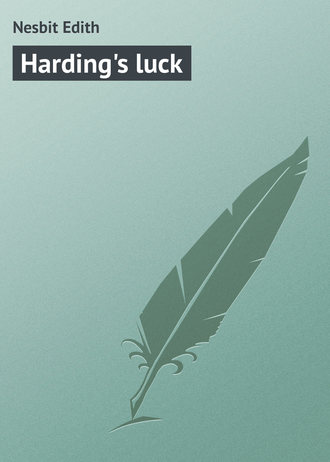
Эдит Несбит
Harding's luck
"His Majesty and the Queen," the little cousins whispered as the State Barge went by.
Then all the galleys fell into place behind the King's barge, and the long, beautiful procession went slowly on down the river.
Dickie was very happy. The little cousins were so friendly and jolly, the grown-up people so kind – everything so beautiful and so clean. It was a perfect day.
The river was very beautiful; it ran between banks of willows and alders where loosestrife and meadowsweet and willow-herb and yarrow grew tall and thick. There were water-lilies in shady back-waters, and beautiful gardens sloping down to the water.
At last the boats came to a pretty little town among trees.
"This is where we disembark," said the little girl cousin. "The King lies here to-night at Sir Thomas Bradbury's. And we lie at our grandfather's house. And to-morrow it is the Masque in Sir Thomas's Park. And we are to see it. I am glad thou'st well of thy fever, Richard. I shouldn't have liked it half so well if thou hadn't been here," she said, smiling. And of course that was a very nice thing to have said to one.
"And then we go home to Deptford with thee," said the boy cousin. "We are to stay a month. And we'll see thy galleon, and get old Sebastian to make me one too.."
"Yes," said Dickie, as the boat came against the quay. "What is this place?"
"Gravesend, thou knowest that," said the little cousins, "or hadst thou forgotten that, too, in thy fever?"
"Gravesend?" Dickie repeated, in quite a changed voice.
"Come, children," said the aunt – oh, what a different aunt to the one who had slapped Dickie in Deptford, sold the rabbit-hutch, and shot the moon! – "you boys remember how I showed you to carry my train. And my girl will not forget how to fling the flowers from the gilt basket as the King and Queen come down the steps."
The grandfather's house and garden – the stately, white-haired grandfather, whom they called My Lord, and who was, it seemed, the aunt's father – the banquet, the picture-gallery, the gardens lit up by little colored oil lamps hung in festoons from tree to tree, the blazing torches, the music, the Masque – a sort of play without words in which every one wore the most wonderful and beautiful dresses, and the Queen herself took a part dressed all in gauze and jewels and white swan's feathers – all these things were like a dream to Dickie, and through it all the words kept on saying themselves to him very gently, very quietly, and quite without stopping —
"Gravesend. That's where the lodging-house is where Beale is waiting for you – the man you called father. You promised to go there as soon as you could. Why haven't you gone? Gravesend. That's where the lodging-house is where Beale – " And so on, over and over again.
And how can any one enjoy anything when this sort of thing keeps on saying itself under and over and through and between everything he sees and hears and feels and thinks? And the worst of it was that now, for the first time since he had found that he was not lame, he felt – more than felt, he knew – that the old New Cross life had not been a fever dream, and that Beale, who had been kind to him and taken him through the pleasant country and slept with him in the bed with the green curtains, was really waiting for him at Gravesend.
"And this is all a dream," said Dickie, "and I must wake up."
But he couldn't wake up.
And the trees and grass and lights and beautiful things, the kindly great people with their splendid dresses, the King and Queen, the aunts and uncles and the little cousins – all these things refused to fade away and jumble themselves up as things do in dreams. They remained solid and real. He knew that this must be a dream, and that Beale and Gravesend and New Cross and the old lame life were the real thing, and yet he could not wake up. All the same the light had gone out of everything, and it is small wonder that when he got home at last, very tired indeed, to his father's house at Deptford he burst into tears as nurse was undressing him.
"What ails my lamb?" she asked.
"I can't explain; you wouldn't understand," said Dickie.
"Try," said she, very earnestly.
He looked round the room at the tapestries and the heavy furniture.
"I can't," he said.
"Try," she said again.
"It's.. don't laugh, Nurse. There's a dream that feels real – about a dreadful place – oh, so different from this. But there's a man waiting there for me that was good to me when I was – when I wasn't.. that was good to me; he's waiting in the dream and I want to get back to him. And I can't."
"Thou'rt better here than in that dreadful place," said the nurse, stroking his hair.
"Yes – but Beale. I know he's waiting there. I wish I could bring him here."
"Not yet," said the nurse surprisingly; "'tis not easy to bring those we love from one dream to another."
"One dream to another?"
"Didst never hear that all life is a dream?" she asked him. "But thou shalt go. Heaven forbid that one of thy race should fail a friend. Look! there are fresh sheets on thy bed. Lie still and think of him that was good to thee."
He lay there, very still. He had decided to wake up – to wake up to the old, hard, cruel life – to poverty, dulness, lameness. There was no other thing to be done. He must wake up and keep his promise to Beale. But it was hard – hard – hard. The beautiful house, the beautiful garden, the games, the boat-building, the soft clothes, the kind people, the uplifting sense that he was Somebody.. yet he must go. Yes, if he could he would.
The nurse had taken burning wood from the hearth and set it on a silver plate. Now she strewed something on the glowing embers.
"Lie straight and still," she said, "and wish thyself where thou wast when thou leftest that dream."
He did so. A thick, sweet smoke rose from the little fire in the silver plate, and the nurse was chanting something in a very low voice.
"Men die,
Man dies not.
Times fly,
Time flies not."
That was all he heard, though he heard confusedly that there was more.
He seemed to sink deep into a soft sea of sleep, to be rocked on its tide, and then to be flung by its waves, roughly, suddenly, on some hard shore of awakening. He opened his eyes. He was in the little bare front room in New Cross. Tinkler and the white seal lay on the floor among white moonflower seeds confusedly scattered, and the gas lamp from the street shone through the dirty panes on the newspapers and sacking.
"What a dream!" said Dickie, shivering, and very sleepy. "Oh, what a dream!" He put Tinkler and the seal in one pocket, gathered up the moon-seeds and put them in the other, drew the old newspapers over him and went to sleep.
The morning sun woke him.
"How odd," said he, "to dream all that – weeks and weeks, in just a little bit of one little night! If it had only been true!"
He jumped up, eager to start for Gravesend. Since he had wakened out of that wonderful dream on purpose to go to Gravesend, he might as well start at once. But his jump ended in a sickening sideways fall, and his head knocked against the wainscot.
"I had forgotten," he said slowly. "I shouldn't have thought any dream could have made me forget about my foot."
For he had indeed forgotten it, had leaped up, eagerly, confidently, as a sound child leaps, and the lame foot had betrayed him, thrown him down.
He crawled across to where the crutch lay – the old broom, cut down, that Lady Talbot had covered with black velvet for him.
"And now," he said, "I must get to Gravesend." He looked out of the window at the dismal, sordid street. "I wonder," he said, "if Deptford was ever really like it was in my dream – the gardens and the clean river and the fields?"
He got out of the house when no one was looking, and went off down the street.
"Clickety-clack" went the crutch on the dusty pavement.
His back ached; his lame foot hurt; his "good" leg was tired and stiff, and his heart, too, was very tired. About this time, in the dream he had chosen to awaken from, for the sake of Beale, a bowl of porridge would be smoking at the end of a long oak table, and a great carved chair be set for a little boy who was not there.
Dickie strode on manfully, but the pain in his back made him feel sick.
"I don't know as I can do it," he said.
Then he saw the three gold balls above the door of the friendly pawnbroker.
He looked, hesitated, shrugged his shoulders, and went in.
"Hullo!" said the pawnbroker, "here we are again. Want to pawn the rattle, eh?"
"No," said Dickie, "but what'll you give me on the seal you gave me?"
The pawnbroker stared, frowned, and burst out laughing.
"If you don't beat all!" he said. "I give you a present, and you come to pledge it with me! You should have been one of our people! So you want to pledge the seal. Well, well!"
"I'd much rather not," said Dickie seriously, "because I love it very much. But I must have my fare to Gravesend. My father's there, waiting for me. And I don't want to leave Tinkler behind."
He showed the rattle.
"What's the fare to Gravesend?"
"Don't know. I thought you'd know. Will you give me the fare for the seal?"
The pawnbroker hesitated and looked hard at him. "No," he said, "no. The seal's not worth it. Not but what it's a very good seal," he added, "very good indeed."
"See here," said Dickie suddenly, "I know what honor is now, and the word of a gentleman. You will not let me pledge the seal with you. Then let me pledge my word – my word of honor. Lend me the money to take me to Gravesend, and by the honor of a gentleman I will repay you within a month."
The voice was firm; the accent, though strange, was not the accent of Deptford street boys. It was the accent of the boy who had had two tutors and a big garden, a place in the King's water-party, and a knowledge of what it means to belong to a noble house.
The pawnbroker looked at him. With the unerring instinct of his race, he knew that this was not play-acting, that there was something behind it – something real. The sense of romance, of great things all about them transcending the ordinary things of life – this in the Jews has survived centuries of torment, shame, cruelty, and oppression. This inherited sense of romance in the pawnbroker now leaped to answer Dickie's appeal. (And I do hope I am not confusing you; stick to it; read it again if you don't understand. What I mean is that the Jews always see the big beautiful things; they don't just see that gray is made of black and white; they see how incredibly black black can be, and that there may be a whiteness transcending all the whitest dreams in the world.)
"You're a rum little chap," was what the pawnbroker said, "but I like your pluck. Every man's got to make a fool of himself one time or the other," he added, apologizing to the spirit of business.
"You mean you will?" said Dickie eagerly.
"More fool me," said the Jew, feeling in his pocket.
"You won't be sorry; not in the end you won't," said Dickie, as the pawnbroker laid certain monies before him on the mahogany counter. "You'll lend me this? You'll trust me?"
"Looks like it," said the Jew.
"Then some day I shall do something for you. I don't know what, but something. We never forget, we – " He stopped. He remembered that he was poor little lame Dickie Harding, with no right to that other name which had been his in the dream.
He picked up the coins, put them in his pocket – felt the moon-seeds.
"I cannot repay your kindness," he said, "though some day I will repay your silver. But these seeds – the moon-seeds," he pulled out a handful. "You liked the flowers?" He handed a generous score across the red-brown polished wood.
"Thank you, my lad," said the pawnbroker. "I'll raise them in gentle heat."
"I think they grow best by moonlight," said Dickie.
So he came to Gravesend and the common lodging-house, and a weary, sad, and very anxious man rose up from his place by the fire when the clickety-clack of the crutch sounded on the threshold.
"It's the nipper!" he said; and came very quickly to the door and got his arm round Dickie's shoulders. "The little nipper, so it ain't! I thought you'd got pinched. No, I didn't, I knew your clever ways – I knew you was bound to turn up."
"Yes," said Dickie, looking round the tramps' kitchen, and remembering the long, clean tapestry-hung dining-hall of his dream. "Yes, I was bound to turn up. You wanted me to, didn't you?" he added.
"Wanted you to?" Beale answered, holding him close, and looking at him as men look at some rare treasure gained with much cost and after long seeking. "Wanted you? Not 'arf! I don't think," and drew him in and shut the door.
"Then I'm glad I came," said Dickie. But in his heart he was not glad. In his heart he longed for that pleasant house where he was the young master, and was not lame any more. But in his soul he was glad, because the soul is greater than the heart, and knows greater things. And now Dickie loved Beale more than ever, because for him he had sacrificed his dream. So he had gained something. Because loving people is the best thing in the world – better even than being loved. Just think this out, will you, and see if I am not right.
There were herrings for tea. And in the hard bed, with his clothes and his boots under the pillows, Dickie slept soundly.
But he did not dream.
Yet when he woke in the morning, remembering many things, he said to himself —
"Is this the dream? Or was the other the dream?"
And it seemed a foolish question – with the feel of the coarse sheets and the smell of the close room, and Mr. Beale's voice saying, "Rouse up, nipper, there's sossingers for breakfast."
CHAPTER V
"TO GET YOUR OWN LIVING"
"No," said Mr. Beale, "we ain't a-goin' to crack no more cribs. It's low – that's what it is. I quite grant you it's low. So I s'pose we'll 'ave to take the road again."
Dickie and he were sitting in the sunshine on a sloping field. They had been sitting there all the morning, and Dickie had told Mr. Beale all his earthly adventures from the moment the redheaded man had lifted him up to the window of Talbot Court to the time when he had come in by the open door of the common lodging-house.
"What a nipper it is, though!" said Mr. Beale regretfully. "For the burgling, I mean – sharp – clever – no one to touch him. But I don't cotton to it myself," he added quickly, "not the burgling, I don't. You're always liable to get yourself into trouble over it, one way or the other – that's the worst of it. I don't know how it is," he ended pensively, "but somehow it always leads to trouble."
Dickie picked up seven straws from among the stubble and idly plaited them together; the nurse had taught him this in the dream when he was still weak from the fever.
"That's very flash, that what you're doing," said Beale; "who learned you that?"
"I learned it in a dream," said Dickie slowly. "I dreamed I 'ad a fever – and – I'll tell you if you like: it's a good yarn – good as Here Ward, very near."
Beale lay back on the dry stubble, his pipe between his teeth.
"Fire away," he said, and Dickie fired away.
When the long tale ended, the sun was beginning to go down towards its bed in the west. There was a pause.
"You'd make a tidy bit on the 'alls," said Beale, quite awestruck. "The things you think of! When did you make all that up?"
"I dreamed it, I tell you," said Dickie.
"You always could stick it on," said Mr. Beale admiringly.
"I ain't goin' to stick it on never no more," said Dickie. "They called it lying and cheating, where I was – in my dream, I mean."
"Once let a nipper out of yer sight," said Mr. Beale sadly, "and see what comes of it! 'No. 2' a-goin' to stick it on no more! Then how's us to get a honest living? Answer me that, young chap."
"I don't know," said Dickie, "but we got to do it som'ow."
"It ain't to be done – not with all the unemployed there is about," said Mr. Beale. "Besides, you've got a regular gift for sticking it on – a talent I call it. And now you want to throw it away. But you can't. We got to live."
"In the dream," said Dickie, "there didn't seem to be no unemployed. Every one was 'prenticed to a trade. I wish it was like that here."
"Well, it ain't," said Mr. Beale shortly. "I wasn't never 'prenticed to no trade, no more'n what you'll be."
"Worse luck," said Dickie. "But I started learning a lot of things – games mostly, in the dream, I did – and I started making a boat – a galleon they called it. All the names is different there. And I carved a little box – a fair treat it was – with my father's arms on it."
"Yer father's what?"
"Coat of arms. Gentlemen there all has different things – patterns like; they calls 'em coats of arms, and they put it on their silver and on their carriages and their furniture."
"Put what?" Beale asked again.
"The blazon. All gentlepeople have it."
"Don't you come the blazing toff over me," said Beale with sudden fierceness, "'cause I won't 'ave it. See? It's them bloomin' Talbots put all this rot into your head."
"The Talbots?" said Dickie. "Oh! the Talbots ain't been gentry more than a couple of hundred years. Our family's as old as King Alfred."
"Stow it, I say!" said Beale, more fiercely still. "I see what you're after; you want us to part company, that's what you want. Well, go. Go back to yer old Talbots and be the nice lady's little boy with velvet kicksies and a clean anky once a week. That's what you do."
Dickie looked forlornly out over the river.
"I can't 'elp what I dreams, can I?" he said. "In the dream I'd got lots of things. Uncles and aunts an' a little brother. I never seen him though. An' a farver and muvver an' all. It's different 'ere. I ain't got nobody but you 'ere – farver."
"Well, then," said Beale more gently, "what do you go settin' of yourself up agin me for?"
"I ain't," said Dickie. "I thought you liked me to tell you everythink."
Silence. Dickie could not help noticing the dirty shirt, the dirty face, the three days' beard, the filthy clothes of his friend, and he thought of his other friend, Sebastian of the Docks. He saw the pale blue reproachful eyes of Beale looking out of that dirty face, and he spoke aloud, quite without meaning to.
"All that don't make no difference," he said.
"Eh?" said Beale with miserable, angry eyes.
"Look 'ere," said Dickie desperately. "I'm a-goin' to show you. This 'ere's my Tinkler, what I told you about, what pawns for a bob. I wouldn't show it to no one but you, swelp me, I wouldn't."
He held the rattle out.
Beale took it. "It's a fancy bit, I will say," he owned.
"Look 'ere," said Dickie, "what I mean to say – "
He stopped. What was the use of telling Beale that he had come back out of the dream just for his sake? Beale who did not believe in the dream – did not understand it – hated it?
"Don't you go turning agin me," he said; "whether I dream or not, you and me'll stand together. I'm not goin' to do things wot's wrong – low, dirty tricks – so I ain't. But I knows we can get on without that. What would you like to do for your living if you could choose?"
"I warn't never put to no trade," said Beale, "'cept being 'andy with a 'orse. I was a wagoner's mate when I was a boy. I likes a 'orse. Or a dawg," he added. "I ain't no good wiv me 'ands – not at working, you know – not to say working."
Dickie suppressed a wild notion he had had of getting into that dream again, learning some useful trade there, waking up and teaching it to Mr. Beale.
"Ain't there nothing else you'd like to do?" he asked.
"I don't know as there is," said Mr. Beale drearily; "without it was pigeons."
Then Dickie wondered whether things that you learned in dreams would "stay learned." Things you learned to do with your hands. The Greek and the Latin "stayed learned" right enough and sang in his brain encouragingly.
"Don't you get shirty if I talks about that dream," he said. "You dunno what a dream it was. I wasn't kidding you. I did dream it, honor bright. I dreamed I could carve wood – make boxes and things. I wish I 'ad a bit of fine-grained wood. I'd like to try. I've got the knife they give me to cut the string of the basket in the train. It's jolly sharp."
"What sort o' wood?" Beale asked.
"It was mahogany I dreamed I made my box with," said Dickie. "I would like to try."
"Off 'is poor chump," Beale murmured with bitter self-reproach; "my doin' too – puttin' 'im on to a job like Talbot Court, the nipper is."
He stretched himself and got up.
"I'll get yer a bit of mahogany from somewheres," he said very gently. "I didn't mean nothing, old chap. You keep all on about yer dreams. I don't mind. I likes it. Let's get a brace o' kippers and make a night of it."
So they went back to the Gravesend lodging-house.
Next day Mr. Beale produced the lonely leg of a sofa – mahogany, a fat round turned leg, old and seasoned.
"This what you want?" he asked.
Dickie took it eagerly. "I do wonder if I can," he said. "I feel just exactly like as if I could. I say, farver, let's get out in the woods somewheres quiet and take our grub along. Somewheres where nobody can't say, 'What you up to?' and make a mock of me."
They found a place such as Dickie desired, a warm, sunny nest in the heart of a green wood, and all through the long, warm hours of the autumn day Mr. Beale lay lazy in the sunshine while Dickie, very pale and determined, sliced, chipped, and picked at the sofa leg with the knife the gardener had given him.
It was hard to make him lay the work down even for dinner, which was of a delicious and extravagant kind – new bread, German sausage, and beer in a flat bottle. For from the moment when the knife touched the wood Dickie knew that he had not forgotten, and that what he had done in the Deptford dockyard under the eyes of Sebastian, the shipwright who had helped to sink the Armada, he could do now alone in the woods beyond Gravesend.
It was after dinner that Mr. Beale began to be interested.
"Swelp me!" he said; "but you've got the hang of it somehow. A box, ain't it?"
"A box," said Dickie, smoothing a rough corner; "a box with a lid that fits. And I'll carve our arms on the top – see, I've left that bit stickin' up a purpose."
It was the hardest day's work Dickie had ever done. He stuck to it and stuck to it and stuck to it till there was hardly light left to see it by. But before the light was wholly gone the box had wholly come – with the carved coat of arms and the lid that fitted.
"Well," said Mr. Beale, striking a match to look at it; "if that ain't a fair treat! There's many a swell bloke 'ud give 'arf a dollar for that to put 'is baccy in. You've got a trade, my son, that's sure. Why didn't you let on before as you could? Blow the beastly match! It's burned me finger."
The match went out and Beale and Dickie went back to supper in the crowded, gas-lit room. When supper was over – it was tripe and onions and fried potatoes, very luxurious – Beale got up and stood before the fire.
"I'm a-goin' to 'ave a hauction, I am," he said to the company at large. "Here's a thing and a very pretty thing, a baccy-box, or a snuff-box, or a box to shut yer gold money in, or yer diamonds. What offers?"
"'And it round," said a black-browed woman, with a basket covered in American cloth no blacker than her eyes.
"That I will," said Beale readily. "I'll 'and it round in me 'and. And I'll do the 'andin' meself."
He took it round from one to another, showed the neat corners, the neat carving, the neat fit of the square lid.
"Where'd yer nick that?" asked a man with a red handkerchief.
"The nipper made it."
"Pinched it more likely," some one said.
"I see 'im make it," said Beale, frowning a little.
"Let me 'ave a squint," said a dingy gray old man sitting apart. For some reason of his own Beale let the old man take the box into his hand. But he kept very close to him and he kept his eyes on the box.
"All outer one piece," said the old man. "I dunno oo made it an' I don't care, but that was made by a workman as know'd his trade. I was a cabinet-maker once, though you wouldn't think it to look at me. There ain't nobody here to pay what that little hobjec's worth. Hoil it up with a drop of cold linseed and leave it all night, and then in the morning you rub it on yer trouser leg to shine it, and then rub it in the mud to dirty it, and then hoil it again and dirty it again, and you'll get 'arf a thick 'un for it as a genuwine hold antique. That's wot you do."
"Thankee, daddy," said Beale, "an' so I will."
He slipped the box in his pocket. When Dickie next saw the box it looked as old as any box need look.
"Now we'll look out for a shop where they sells these 'ere hold antics," said Beale. They were on the road and their faces were set towards London. Dickie's face looked pinched and white. Beale noticed it.
"You don't look up to much," he said; "warn't your bed to your liking?"
"The bed was all right," said Dickie, thinking of the bed in the dream. "I diden sleep much, though."
"Any more dreams?" Beale asked kindly enough.
"No," said Dickie. "I think p'raps it was me wanting so to dream it again kep' me awake."
"I dessey," said Beale, picking up a straw to chew.
Dickie limped along in the dust, the world seemed very big and hard. It was a long way to London and he had not been able to dream that dream again. Perhaps he would never be able to dream it. He stumbled on a big stone and would have fallen but that Beale caught him by the arm, and as he swung round by that arm Beale saw that the boy's eyes were thick with tears.
"Ain't 'urt yerself, 'ave yer?" he said – for in all their wanderings these were the first tears Dickie had shed.
"No," said Dickie, and hid his face against Beale's coat sleeve. "It's only – "
"What is it, then?" said Beale, in the accents of long-disused tenderness; "tell your old farver, then – "
"It's silly," sobbed Dickie.
"Never you mind whether it's silly or not," said Beale. "You out with it."
"In that dream," said Dickie, "I wasn't lame."
"Think of that now," said Beale admiringly. "You best dream that every night. Then you won't mind so much of a daytime."
"But I mind more," said Dickie, sniffing hard; "much, much more."
Beale, without more words, made room for him in the crowded perambulator, and they went on. Dickie's sniffs subsided. Silence. Presently —
"I say, farver, I'm sorry I acted so silly. You never see me blub afore and you won't again," he said; and Beale said awkwardly, "That's all right, mate."
"You pretty flush?" the boy asked later on.
"Not so dusty," said the man.
"'Cause I wanter give that there little box to a chap I know wot lent me the money for the train to come to you at Gravesend."
"Pay 'im some other day when we're flusher."
"I'd rather pay 'im now," said Dickie. "I could make another box. There's a bit of the sofer leg left, ain't there?"
There was, and Dickie worked away at it in the odd moments that cluster round meal times, the half-hours before bed and before the morning start. Mr. Beale begged of all likely foot-passengers, but he noted that the "nipper" no longer "stuck it on." For the most part he was quite silent. Only when Beale appealed to him he would say, "Farver's very good to me. I don't know what I should do without farver."
And so at last they came to New Cross again, and Mr. Beale stepped in for half a pint at the Railway Hotel, while Dickie went clickety-clack along the pavement to his friend the pawnbroker.
"Here we are again," said that tradesman; "come to pawn the rattle?"
Dickie laughed. Pawning the rattle seemed suddenly to have become a very old and good joke between them.
"Look 'ere, mister," he said; "that chink wot you lent me to get to Gravesend with." He paused, and added in his other voice, "It was very good of you, sir."
"I'm not going to lend you any more, if that's what you're after," said the Jew, who had already reproached himself for his confiding generosity.
"It's not that I'm after," said Dickie, with dignity. "I wish to repay you."
"Got the money?" said the Jew, laughing not unkindly.
"No," said Dickie; "but I've got this." He handed the little box across the counter.
"Where'd you get it?"
"I made it."
The pawnbroker laughed again. "Well, well, I'll ask no questions and you'll tell me no lies, eh?"
"I shall certainly tell you no lies," said Dickie, with the dignity of the dream boy who was not a cripple and was heir to a great and gentle name; "will you take it instead of the money?"
The pawnbroker turned the box over in his hands, while kindness and honesty struggled fiercely within him against the habits of a business life. Dickie eyed the china vases and concertinas and teaspoons tied together in fan shape, and waited silently.
"It's worth more than what I lent you," the man said at last with an effort; "and it isn't every one who would own that, mind you."
"I know it isn't," said Dickie; "will you please take it to pay my debt to you, and if it is worth more, accept it as a grateful gift from one who is still gratefully your debtor."
"You'd make your fortune on the halls," said the man, as Beale had said; "the way you talk beats everything. All serene. I'll take the box in full discharge of your debt. But you might as well tell me where you got it."
"I made it," said Dickie, and put his lips together very tightly.
"You did – did you? Then I'll tell you what. I'll give you four bob for every one of them you make and bring to me. You might do different coats of arms – see?"
"I was only taught to do one," said Dickie.
Just then a customer came in – a woman with her Sunday dress and a pair of sheets to pawn because her man was out of work and the children were hungry.
"Run along, now," said the Jew, "I've nothing more for you to-day." Dickie flushed and went.
Three days later the crutch clattered in at the pawnbroker's door, and Dickie laid two more little boxes on the counter.
"Here you are," he said. The pawnbroker looked and exclaimed and questioned and wondered, and Dickie went away with eight silver shillings in his pocket, the first coins he had ever carried in his life. They seemed to have been coined in some fairy mint; they were so different from any other money he had ever handled.







